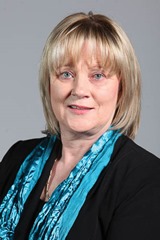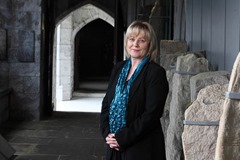Phil Prendergast MEP
 Labour’s Phil Prendergast was co-opted to represent Ireland South in 2011 after Alan Kelly’s election as TD. She was previously a Senator (2007-2011). Phil sits on three European Parliament committees: Internal Market and Consumer Protection; Agriculture and Rural Development; and Petitions. She is married to Ray with two sons, Luke and Alan.
Labour’s Phil Prendergast was co-opted to represent Ireland South in 2011 after Alan Kelly’s election as TD. She was previously a Senator (2007-2011). Phil sits on three European Parliament committees: Internal Market and Consumer Protection; Agriculture and Rural Development; and Petitions. She is married to Ray with two sons, Luke and Alan.
How did your political career begin?
I first became involved in politics in 1985. As a nurse and midwife in Ireland and the United Kingdom, I had a unique insight into what really matters to people. I wanted to do more and I became convinced that politics would be a way to contribute more to the lives of families nation-wide. After almost thirty years in politics, I still believe that.
I was a midwife at South Tipperary General Hospital for over twenty years. While there I was an active member of the Irish Nurses and Midwives Organisation and served on the executive board in 1994. I was first elected to Clonmel Corporation in 1994 as a member of the Workers and Unemployed Action Group and twice served as Mayor of Clonmel. I was elected to South Tipperary County Council in 1999 and served as a Senator in Seanad Éireann from 2007.
What are your key priorities as MEP?
Everyone has the right to healthcare but in Ireland today a lack of availability and access to affordable services is threatening that right. There has been an unacceptable decline in the number of health facilities and professional staff serving the community. The resulting longer wait times ultimately lead to higher medical costs. Those who can afford it to turn to private health services and those who cannot are effectively shut out of the health system.
I am fighting to improve timely access to affordable health services by supporting a cross-border healthcare law that puts patient rights first.
My place on the Consumer Affairs Committee in Parliament allows me to have an impact on issues that are diverse but also universally applicable to Irish people. Everything from copyright law to public body transparency comes before the committee. One recent example was our response to claims that mobile service providers charged too much for roaming. After reviewing the claims, we decided that legislation had to be introduced to limit these charges.
What do you count as your main achievements to date?
I would highlight my work on professional mobility, especially as far as patient safety safeguards are concerned. Having eliminated a loophole in current EU law, I played a full part in a successful push for the establishment of a new EU-wide alert system, notifying all national authorities when doctors and nurses are struck off due to criminal convictions or disciplinary action, thus preventing them from moving to practice abroad.
Moreover, I brought in provisions requiring language proficiency tests prior to the recognition of healthcare workers’ qualifications gained abroad.
I would also stress the importance of the work I have been doing to tackle the scourge of directory scams. Together with other colleagues, I made a continuous effort to bring this matter up in Parliament over the years, particularly on behalf of SMEs, the most common targets of such rogue companies.
This autumn, I led my group’s work on a parliamentary report on this problem and we have finally persuaded the Commission to start a legislative review to protect family businesses and SMEs from these costly scams.
 As a former Senator, what do you see as the best way forward for Seanad Éireann?
As a former Senator, what do you see as the best way forward for Seanad Éireann?
Whatever your opinion on the Seanad is, one issue is a fact. It’s not democratic in its current form. I’m certainly not in favour of only certain university graduates having a vote. It’s elitist and precludes a large group in society. If every citizen had a say, I have no doubt they’d be more interested in the workings of the upper house and they would be able to see the bright minds who provide a crucial voice to Irish society, like my Labour colleague Senator Ivana Bacik.
I would also like to see the vote for the Seanad elections taking place on the same day as the general election. There would be more media attention and it avoids members of Seanad Éireann being branded as “Dáil rejects”. This would also involve little additional cost. Generally speaking, the Seanad needs to be expanded and given more powers, especially when it comes to reviewing new legislation.
What do you enjoy most (and least) about political life?
My job is rewarding when I see my work come to fruition and it feels me with pride that the economy is beginning to improve. Our recent exit from the bail-out has impressed many of my colleagues in Brussels. As a patriotic MEP, it’s satisfying to represent Ireland and fight for our cause with some of the superpowers of Europe.
What I like least about political life is the long hours and copious amount of traveling MEPs have to endure. Most days, I’m up at 6am and may not stop working until late that evening. My days as a midwife have held me in good stead when it comes to the lack sleep.
How do you relax outside work?
If I’ve a second to spare, I spend it with my family at my home in Tipperary. I’ve two sons who are in their twenties so it’s great to catch up with them and let’s not forget my dogs!
In my job a sense of humour is crucial, for your morale. We can all take ourselves too seriously and there’s nothing like a good laugh at yourself when the time calls for it. I’m a massive fan of Brendan O’Carroll. I recently I went up Dublin for the live Mrs Brown’s Boys show. It’s such a funny show, a great release.





